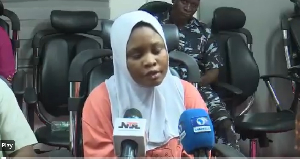A rescued Nigerian migrant, Mercy Olugbenga, has recounted how she was confined for months, and nurses repeatedly took her blood so it could be used for her employer’s ailing mother while she lived in Libya.
Speaking on the ARISE TV Sunrise Daily programme on Wednesday, Mercy said that she took a decision to travel to Libya after selling family property to pay for her sick mother’s treatment.
According to her, she had dropped out of school at the age of 20 years and was lured to Libya with the promise of greener pastures to enable her to raise money to care for her sick mother.
Instead, she found herself trapped in modern-day slavery.
“My mum was sick. She had a kidney problem. So we had to sell all her properties, and there was nothing else. There is no family anywhere,” she said.
Mercy, an indigene of Kabba in Kogi State, said she spent four years working in Libya
“For one year and six months, I worked without receiving a kobo, because I had to pay the agent who took me to Libya the sum of about two and a half million naira.
“I was maltreated, I changed jobs, and at one point, locked up in a house where my blood was drawn without my consent,” she recalled tearfully.
Describing the harsh treatment of African migrants by some Libyan employers, she said, “What I experienced in Libya, not me alone, other Africans and other immigrants, other illegal migrants, those people they don’t like us.”
Explaining further, she said, “Maybe they see us as rivals, or because they know wherever Nigerians are, they might take over. So they treat us like animals.”
Her worst ordeal, she said, came at the last place she worked, where she was locked in a room for a year.
Mercy said she had originally been employed to care for the employer’s mother and do house chores, but became trapped in an exploitative situation once the woman’s medical needs emerged.
“They locked the door before going out. They locked the outside door, they locked the gate door,” she said, describing how she was sealed in the house and prevented from leaving.
During that confinement, Mercy said nurses visited monthly to take her blood.
At first, she assumed the draws were routine health checks, but later realised the true purpose.
“I thought it was their normal routine. But in this case, it is every month, which is not supposed to be so. So, later I got to know that they wanted my blood matches with their mum’s,” Mercy recounted.
She explained that her employer was transfusing her blood to cater for the medical needs of the mother she was employed to care for.
“I don’t want any young girl or boy to go through what I went through. Please don’t follow this route,” Mercy pleaded.
She pleaded for assistance to return to school, which she abandoned in 2018 at 300 Level.
PUNCH Online reports that this is not the first time a Nigerian-Libyan returnee has recounted harrowing experiences in the country.
In an interview with The PUNCH in July, Victoria Abosede, a 28-year-old single mother of two, narrated the terrible experience of drinking the same water as camels and donkeys, working as a maid in Libya, and a horrible trip of one month and two days through the desert.
According to an International Organisation for Migration report, at least 20,197 Nigerians stranded in various countries were voluntarily returned as of March 2025.
The report states that women and girls constitute nearly 88 per cent of the returnees, while men account for 13 per cent.
Meanwhile, Chairman/CEO, Nigerians in Diaspora Commission, Abike Dabiri-Erewa, who received Mercy, commended her courage and survival, describing her as “one of the lucky ones,” noting that many others have died in the desert or the Mediterranean Sea, while some remain untraceable.
According to a statement by the commission’s Head of Media, Public Relations and Protocols Unit, Abdur-Rahman Balogun, the NIDCOM boss reiterated that irregular migration amounts to “voluntary suicide” and cautioned Nigerian youths to always seek safe and legal channels for travel.
She commended President Bola Tinubu for introducing NELFUND, which will provide opportunities for Nigerians like Mercy to complete her education rather than drop out for lack of funds.
Diaspora News of Thursday, 4 September 2025
Source: www.punchng.com













